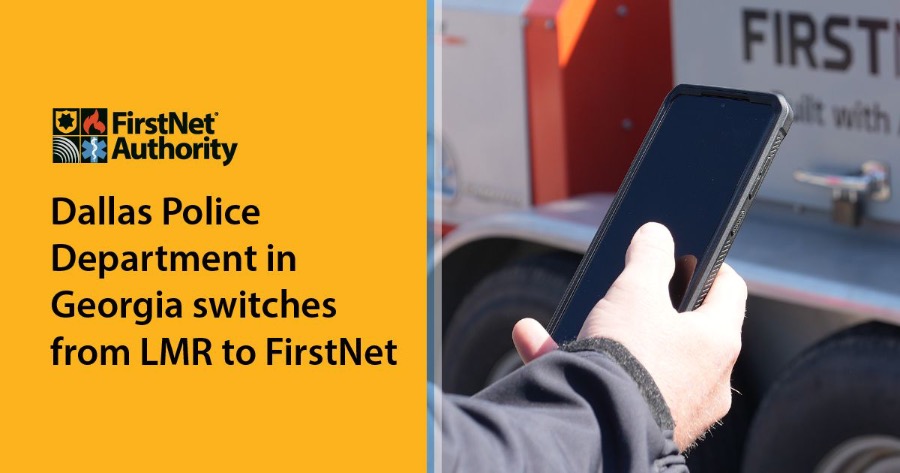
When the Dallas Police Department shifted from LMR to smartphones powered by FirstNet, it was uncharted territory.
“I was very skeptical when we started the process,” said Chief Duvall. “I never dreamed it would be as good of a system as it is.”
For the last 18 months, the department has taken approximately 30,000 calls using FirstNet as their primary communications platform. Chief Duvall said the benefits of FirstNet far outweigh any of the challenges of switching. “The system is working great. It’s been fantastic.”
Before the Dallas Police Department made the switch, they wanted to make sure the new system was reliable and had the same coverage as traditional VHF or 800-megahertz radios. With FirstNet, Chief Duvall said, “We have better coverage than we had with the previous radio system. We don't have any dead spots in our city.”
Many police departments have an entire division devoted to maintaining radios. Chief Duvall said, “Another plus is that we have very minimal maintenance. Updates get pushed out to us, and we don't have any towers to maintain.” Instead of visiting a radio shop to set up talk groups, he explained, “You can build a talk group in just probably five minutes.”
The functionality of devices has been another benefit of switching to FirstNet. “The equipment has been outstanding, and just one device takes the place of several others,” said Chief Duvall. “A smartphone does a plethora of different things that we did not previously have or that we had from different pieces of equipment. Officers with smartphones can take photos, and we're adding the capability to run license checks and write e-citations.”
When Chief Duvall started in his position in 2018, the Dallas Police Department had its own dispatch center that was secondary to the county’s primary public safety answering point (PSAP). However, the VHF radio system was at the end of its life and needed replacing.
Their first selection was an 800-megahertz radio system, but when they discovered the cost was $2 million, they began looking at other options. They considered merging with the county PSAP, but that was stymied by staffing shortages and the extra cost of consolidating systems. Finally, they researched switching to mobile broadband communications.
With support from FirstNet and the Georgia Emergency Management Agency, the Dallas Police Department planned to establish its own PSAP with public safety broadband as the communications platform. The total cost was less than $200,000, with most of that amount going to equipping the dispatch center.
“From a management standpoint, $200,000 compared to upwards of $2 million is a no brainer,” said Duvall, “The cost benefit of what we're doing is beyond comparison.”
The benefits extend beyond implementation costs. “The cost of the devices our officers are using is $1 compared to the cost of an actual LMR, which is close to $1,000.” This low cost allows the department to always have plenty of backup devices ready to go.
Any new system experiences challenges. The first one the Dallas Police Department faced was the idea of change. “The biggest thing was just the psychological factor of going from an actual LMR to a cell phone,” said Chief Duvall, “but our staff made the transition very well.”
The department made some modifications that helped with the transition. Most officers use a wireless mic with their device. And they are looking at a new broadband device that mirrors a radio with two knobs on top for channel selection and volume control. “The psychological challenges are being met by technology. There are so many different devices out there,” said Chief Duvall.
The department also needed to stay interoperable with partner agencies like the sheriff’s office and the county PSAP. They built talk groups for those agencies and gave them each a FirstNet device. “We can always maintain communications, so that was an easy obstacle to overcome,” said Chief Duvall.
“We were able to do a lot of trial and error,” he said. “We tried so many things and found what we liked. The technology is constantly improving.”
Chief Duvall hopes the Dallas Police Department model will help other agencies as they look to modernize their communications.
“We're very fortunate that all the technology was in place to make us successful, and it’s only going to get better,” he said. He sees public safety broadband as the future of public safety communications. “One of the biggest benefits is that cell phone usage in public safety is bypassing LMR usage,” he said.
For cost reasons alone, Chief Duvall advises other agencies to consider FirstNet. He said, “You can utilize all the millions of dollars you save to buy vehicles or equipment or build parks or anything else.”
“This may not be for everybody, but it’s worth looking into, especially when you've got a tool like FirstNet that is so reliable, inexpensive, and safe.”